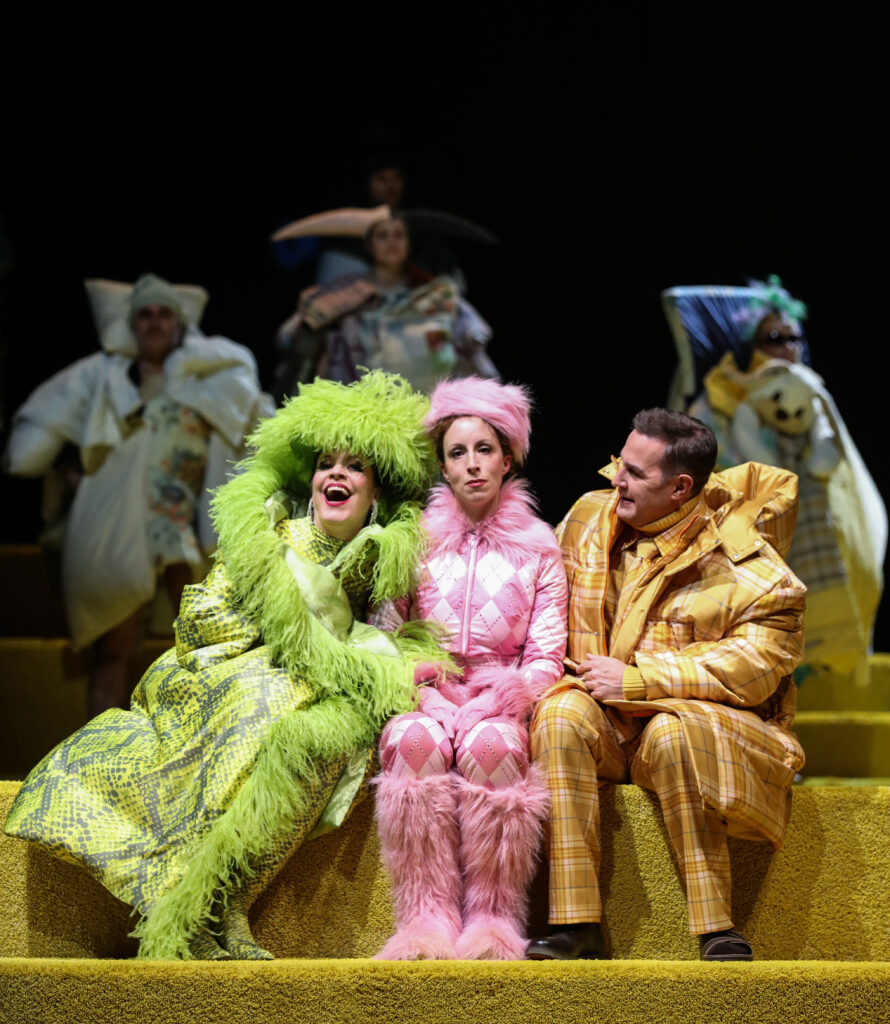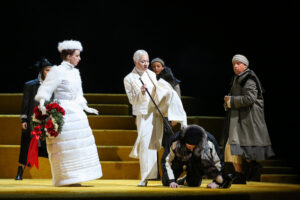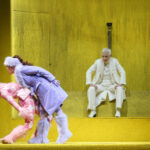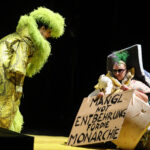
Ursula Pfitzner (Mrs. Peachum), Johanna Arrouas (Polly), Carsten Süss (Jonathan Peachum)
©) Barbara Pállfy / Volksoper Wien
In Brecht’s satire, music by Kurt Weill, Money rules the world, and Poverty is a ‘business model’. The Threepenny Opera, Die Dreigroschenoper, is a subversive take on John Gay’s ‘The Beggar’s Opera’. Jonathan Jeremiah Peachum has founded ‘Beggar’s Friend’, a ‘licensed’ professional alms business to get people to part with their money. So in the first scene, the new beggar Filch has to agree to pay Peachum 50% of his earnings. He’d been previously beaten up for begging in Peachum’s territory.
But, in Volksoper’s production (Maurice Lenhard), class politics is transposed to 21st century gender politics, and it doesn’t quite work. Leading roles – ‘male’ gangsters in a mobster culture – are transgendered. Gangster boss Macheath is now played by a woman, Sona Macdonald.
The Peachums, a fantastical, eccentric couple- remimniscent of Sondheim’s Sweeney Todd- are well characterised by baritone Carsten Süss in a yellow, designer parka, Mrs. Peachum (Ursula Pfitzner), her mezzo outstanding, she in lime green, with a fluffy hat, like a dowager Duchess. Their errant daughter Polly, secretly married to arch enemy Macheath, is beautifully sung by Joanna Arrouas, in ‘Barbarasong’ wearing a white jacquard mini-dress, spotlighted under a fashionably magenta-lit stage.
In that Mack the Knife ballad, Die Moritat von Mackie Messer, the orphan’s apparent naivite, contrasts with the content of the gruesome lyrics.
‘And the shark it has teeth, and it wears them in his face, And Macheath, he has a knife, But the knife can’t be seen.’ Und der Haifisch, der hat Zähne, und die trägt er im Gesicht, Und Macheath, der hat ein Messer, Doch der Messer sieht man nicht. The Ballad comparing Macheath to a shark, lists his crimes, including a murder on the Strand, the disappearance of a wealthy man robbed of  his money, a woman stabbed to death, an arson in Soho killing seven children, and the rape of a young widow.’
his money, a woman stabbed to death, an arson in Soho killing seven children, and the rape of a young widow.’
And on he comes! On the steps, laid out, Sona MacDonald, husky-voiced, from a tradition of cross-dressed German cabaret chanteuse-from Dietrich to Amanda Lear: of indeterminate gender. Yet Macheath is described as a fearsome man (Du bist ein schreckliche Mensch.) Anyway, MacDonald is oustanding. In her magnetic stage numbers, she steals the show. Even, as in Act 3, locked up, chained in a police prison cell, she observes the stage commandingly.
Macheath is the victim of a conspiracy hatched by Inspector ‘Tiger’ Brown, Marco di Sapia, in a beige trench coat, the iconic, tall British copper. And Peachum, is out for revenge: he’ll be exposed in the ‘Old Bailey’.
Polly (Peachum), now Mrs Macheath, is introduced to Macheath’s gang, (Polly’s Song). A woman at this time!, they challenge her. Arrouas, in a scarlet red dress, yet no gangster’s moll, grabs the man, and locks his arms behind his back.
MacDonald shines in the sultry numbers, like Melodram, the mood intensified by accompamying horn (euphinium?) solo. The gangsters ‘hideaway’ rises out of the stage set. Under chandelier light fittings, the mob, are louchely lying around. MacDonald, in a show stopper, sings Im Bordell, (in a bordello.) The sleazy atmosphere is evoked, to saxophone accompaniment, with piano and percussion; sultry and decadent, Zuhalter Ballade a little reminiscent of Argentinian tango.
Sapio’s Superintendant Brown hates to do it- old friends, served in the wars – but has to lock him up: so Macheath is chained up! The stage set – a maze reflecting the labyrinthine plot- opens up to reveal an open-front prison cell. MacDonald sings of the comforts of freedom (Friedenheit bequem) in ‘Ballad of a Pleasant Life’. The dossers on stage, like the living dead of a Stanley Spencer Cookham painting, rise up in a chorus.
 Act 3 opens with Eifersucht, Jealousy, Lucy’s revenge plea at her rival Polly, who’s stolen her man. Julia Koci, is explosive, her coloratura soprano virtuosic. There’s marvelous solo horn playing, again with drums and piano accompaniment. In a fiery scene, Lucy will try to poison her. Koci’s is one of the standout arias, along with Oliver Liebl, cross-dressed as Jenny (Spelunkenjenny) in a parody of a ‘tunte‘.
Act 3 opens with Eifersucht, Jealousy, Lucy’s revenge plea at her rival Polly, who’s stolen her man. Julia Koci, is explosive, her coloratura soprano virtuosic. There’s marvelous solo horn playing, again with drums and piano accompaniment. In a fiery scene, Lucy will try to poison her. Koci’s is one of the standout arias, along with Oliver Liebl, cross-dressed as Jenny (Spelunkenjenny) in a parody of a ‘tunte‘.
In an agit prop demo we see hand-painted placards ‘Mangel Entbehrung fur die Monarchie’. The ‘Opera’, loosely based on Gay’s The Beggar’s Opera (18th Century), takes place of course in London. There’s an unfortunate (untimely) reference to the crowning of the Queen? (When?) There’s a reference, in the plot (Act 2) to Peachum’s threat to sabotage the coronation if Macheath isn’t arrested…And Brown declares, ironically, That such a criminal can run loose in London! There’s a surfeit of witty puns, like Sukey Tawdry, but there’s no text, NO TITLES, NO ENGLISH TRANSLATION!
The ‘beggars’, poor, destitute, are like motley clothes horses: wildly dressed, in multicoloured rags, patched-up clothes like collages. But should these poor down-and-outs be ridiculed, or patronised as fashion victims?  (Even now, in England thousands, jobless, homeless, or in low-paid jobs, are queuing at food banks.)
(Even now, in England thousands, jobless, homeless, or in low-paid jobs, are queuing at food banks.)
In the closing Act Macheath delivers an anti-capitalist diatribe against the banks in his address to his fellow citizens Mitburgher. It shows how dated Brecht’s Communist agenda now seems. (Or is it?) MacDonald’s impassioned plea is accompanied by Weill’s terrific orchestration (brittle, anarchic, with horn and windplayers.) And pushing the anti-capitalist message, what’s this, a suspended upside-down golden calf?
Finally, Macdonald’s Macheath sings his signature Mack the Knife, seated symbolically beneath the golden calf, accompanied by piano, MacDonald in a gold lame dress, and now joined by the child singer.
In the event, the transgender casting of Macheath is not unacceptable, and makes sense given the cross-dressing tradition of cabaret. And gender fluidity goes right back historically, most noteworthy in Shakespeare’s comedies. (I had wrongly assumed the whole production might be transgendered!)
Nevertheless, ‘Die Dreigroschenoper‘ has a huge amount of dialogue. So it’s reasonable to have surtitles in an international opera house. Especially as many songs, translated, ‘Mack the Knife’ and ‘Pirate Jenny’, are much recorded ‘standards’, Louis Armstrong’s and Bobby Darin’s ‘Mack’ in Congess’s National Recordings Registry. (And Weill, emigrating to the US with Lotte Lenya in 1935, became a successful composer of American ‘musicals’.) Unfortunately it’s difficult to wholeheartedly recommend Volksoper’s musically distinguished production to non-German speakers. P.R. 4.01.2023
Photos: Johanna Arrous (Polly), Sonia Macdonald (Macheath), Martina Dorak (Hakenfinger-Jacob); Julia Koci (Lucy), Johanna Arrouas (Polly), Sona MacDonald (Macheath); Ursula Pfitzner (Mrs.Peachum); featured image, Nicolaus Hagg, Sona MacDonald
© Barbara Pálffy/ Volksoper Wien
